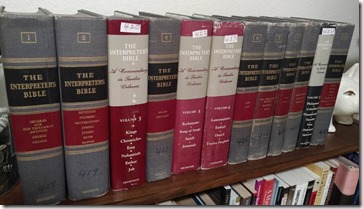Archive for the ‘Uncategorized’ Category
The Problem with Waiting Too Long
I wrote an article last week about waiting. I want to tell you why I have such a bee in my bonnet about that messaging and how wrong it is.
It’s not just that I have been encouraged to wait around a lot (as you might expect) being told as a young person starting in ministry that I was too young for everything I was ready to do, and needed to wait around until i satisfied someone else’s criterion for minimum age.
It’s not just a personal concern. It’s also a pastoral one.
Me? Who’s me. I don’t matter, I’m weird anyway. But I have seen this idea impact my congregants negatively, sometimes fatally.
I want to tell you the story of my friend Rick. Rick was in his 50s when I met him, and he had not been active int he church for a long while, but he came by one day asking if he could borrow some tables. I fortunately was in the office and was able to help him, and through that small act of generosity a new friendship was formed and he started attending again.
Rick was young for his age, both in good ways and bad ones. He was vibrant and active, and a little immature. he had a drug problem early in his life and those sorts of things often lead to stinted development, but he was clean now and seeking to walk the straight and narrow.
Rick would often tell me about hos it had been his lifelong ambition to be a full time minister. To preach the gospel, and how, in the short term he hoped to start a mission ministry to serve the poor near him. I said that sounded great.
He also said, many times “You know, when I was younger I would sometimes get out ahead of God, and the preachers would have to reel me back in, get me to not go so fast” at one point I got kind of annoyed by this “god is really fast” I said “god is faster than you, you can’t outrun him” but he had been taught this enough times to internalize it.
”I have so much I want to do, so much God has left for me” he would say “I don’t feel like this is the end” Rick had terminal cancer.
He believed (bargaining) that God would keep him alive, because surely he still needed to fulfill all the promises he had made to god his whole life long, promises which he wasn’t procrastinating on, so much a piously and obediently waiting to be given permission to begin. The man was twice my age, with a year to live, and still hoping to get started at some nonspecific day in the future.
Rick became a deacon at our church, he served as a wonderful member. But he never got to become the preacher he could have been, nor start the mission, nor spread his art and his poetry beyond our little family. He waited too long

The Constipation of Evangelical Waiting
They will tell you to wait.
And wait, and wait.
If you grow up in the Christian church you will no doubt be told over and over again that you are not ready for things, that you should practice more discernment, and that it is a holy and laudable thing to “wait upon the lord” for the “appropriate time” to so any manner of things, and that in the mean time you need to simply be a religious consumer, and an attendee at whatever vague program they are currently looking for attendees for,
 It is a lie.
It is a lie.
It’s a lie from the pit of hell and it results in thousands if not millions of Christians who outta be out changing the world, instead sitting around trying to practice a nonexistant spiritual discipline.
That word, in Isaiah 40:31, the one that was translated “wait upon the LORD? It doesn’t mean that.
The original Hebrew word is קָוָה which means to be strong, to be tense, to be ready. Enduring, awaiting. The image is of a warrior with his sword drawn, because he is waiting for the moment to act within the next couple seconds.
It is the exact polar opposite of someone waiting around doing nothing, which is what the image conjures today. But in the early 1600s when the KJV was written, that’s what “wait” meant in English. It’s where we get the idea of a “waiter” as someone who serves. We are to “wait on the LORD” meaning serve him. A waiter is not someone who is idle. A waiter is someone who is standing ready to help and to serve, anticipating your needs, looking for anything they might be able to bring you.
But over time we grew to like the wrong meaning of that verse (it served the selfish needs of religious leaders) and now when new translations come out, they tend to keep that English word the same, even though the language has moved on and it doesn’t mean the same thing anymore.
Also, Jesus wasn’t a carpenter in the sense we know carpenters today. he was a carpenter in the 1600s sense. A builder.
Extraordinary Claims
Let’s take a break from our broccoli scriptures for a moment and go back to regular apologetics. I want to pick on another silly Meta-debate that occurs regularly in circles where people attempt to speak rationally about Jesus. The claim that “Extraordinary claims require extraordinary evidence”
 This idea came from Carl Sagan who, I have to say I am an enormous fan of. He is a brilliant man and a passionate and patient teacher of science, so much so that I am willing to completely and totally ignore the fact that he sounds like Kermit the Frog.
This idea came from Carl Sagan who, I have to say I am an enormous fan of. He is a brilliant man and a passionate and patient teacher of science, so much so that I am willing to completely and totally ignore the fact that he sounds like Kermit the Frog.
His series Cosmos dropped this line, along with other all time showstoppers like “We are made of star stuff” and “If you want to bake an apple pie from scratch you must first invent the universe”
And like most of the things he says, he is right. Extraordinary do indeed require extraordinary evidence. Specifically, the context in which he spoke about this was with regard to tales of alien encounters. Certainly an interesting claim, and one which would be very significant if true, but with what evidence?
Sagan of course is no friend of religion. (a point of some irony considering his famous series is taken from a common biblical word meaning an ordered and structured world. So it’s hard to accuse his quote from being taken out of context when it is applied to God…. But it totally is.
I mean listen. I haven’t read every Sagan book or watched every Sagan interview, and maybe he did attempt to apply the so called “Sagan Standard” to the question of God personally. I have seen him do similarly irrational things when the topic turned to religion. But to do so would be to cheapen the actual meaning of the phrase enormously.
“Extraordinary claims require extraordinary evidence” is the lesson of a spectacular teacher exploring his students to think! and to never stop thinking. It is the word of a man fascinated by UFOs but disciplined enough in his thinking to model for us an approach to that idea which asks more, and searches more.
When it is used in Christian contexts it is used to shut down conversation.
To end thinking.
To insist that the reality I prefer (that God would not exist) is the true and final reality unless you my rhetorical opponent can provide evidence which I consider “extraordinary” because that is what I have decided that your claim is. It’s intellectual laziness, is what it is.
Sagan investigated UFOs he investigated horoscopes, he was familiar with all the evidence that was presented, and he rightfully, sadly, found it lacking. He didn’t conclude that aliens do not exist or that they have not visited. Quite the opposite, he remained “agnostic” on the subject, but fairly weighed the evidence before him and found it light.
So few of us do the same thing for our metaphysical assumptions. So few of us take time to regard and to analyze the cosmological, axiological, historical and philosophical arguments for theism and it’s related ideas.
To illustrate this. Consider the opposite claim. Setting aside any unjustified gag reflexes you hay have taught yourself regarding the burden of proof consider the claim (and yes, is it a claim) that every religion of the world is essentially wrong. That the supernatural itself, does not exist. That there is no mountain all faiths are climbing differently, nor is there one that is climbing the right mountain, but that mountains do not exist.
That’s pretty extraordinary.
I don’t think that’s a bad thing. Actually i think the claims that atheism makes are really advanced in terms of anthropology and culture in a lot of interesting ways. But it runs counter to everything everyone has believed for pretty well always. So where is the extraordinary evidence of that wonderful idea?
I
That’s a shame
Because a really good teacher taught us an important phrase about a standard of thinking, which reminds us all to be disciplined in not jumping to easy assumptions or preferred answers, and instead to keep on thinking and streaking and looking for answers to difficult questions and I think it deserves more respect than that. Because it’s true.
“Extraordinary claims require extraordinary evidence”
German Style Boardgames
Juergen Moltmann said that the way to change the world is by playing games.
So I want to talk a bit about the Board Game Renaissance. That is going on in the world right now, and it’s theological importance. A lot of it comes from a new way of thinking about board games, which began in Germany and has since expanded internationally.
American Style board games like Battleship, Risk, and Monopoly, tend to feature militaristic themes, with direct player interaction, player elimination and zero-sum win conditions. This is not only emblematic of certain cultural values, it’s also practically problematic especially in family situations because "Daddy just shot you dead and now you can’t play, you have to sit and watch Daddy and Mommy destroy each other" isn’t fun and doesn’t lead to happy memories.
Monopoly in particular was devised as a thought experiment to teach children how horrible and destructive capitalism is. You are supposed to feel desperate and frustrated, that’s a feature of the game.
German Style board games, by contrast, deal with primarily agricultural and economic themes, avoid player elimination, indirect competition and often cooperation, and victory points (non-zero-sum) The strategy of these games is usually quite a bit deeper, and less dependent upon luck.
The most popular one which you are probably familiar with is Settlers of Catan, By Rio Grande Games 
I have a love-hate relationship with Settlers. I love it because it introduced millions of people to German Style games. I hate it because among these games it is one of the worst. The winning strategy is easily discernable after the first game or two and after that it’s boring. With that said, everyone loves it, your family probably will too, so if you are looking for a game, consider grabbing it.
I can more recommend more heartily, Ticket to Ride, by Days of Wonder 
This one involves building transcontinental railroads (What continent depends on the edition, but the United States edition is really good). Everyone plays until the end, and players strategize over when to claim the best routes, but never attack one another. The strategy for this one is actually really deep despite the rules being simple enough for small children.
Another really good one is Tokaido, By Passport 
The story of this one is that all of the players are fellow travelers on the road from Tokyo to Kyoto, and you compete to be the player who enjoys their peaceful journey the most. This involves seeing the most views, eating the best variety of food, and buying impressive collections of souvenirs. Because there are so many opportunities along the Tokaido, it takes a practice game to cement the rules, but once you learn them it is a lot of fun. One of my favorite things about this one is that there are absolutely no dice. You decide how far you move.
Too much kid stuff? Ready for a darker theme? Pandemic, By Z-Man

In this game all the human players work together. There are several diseases that have broken out, and only you, the agents of the WHO can save the world from total destruction. You each have different abilities, and try to save the world "better" than one another, but mostly you just try to prevent the apocalypse. Everybody wins if you cure the diseases, nobody wins if the outbreak exterminates all human life.
One last one just for fun, Fluxx, by local Austin Game studio, Sam Jackson Games

There is almost no strategy possible with this one, because the win conditions can change at any moment. It’s just ridiculous fun. There are theme editions available for whatever your family likes, like Pirates, Oz, or Monty Python. As far as I am aware there is no "Reformed Theology Fluxx" at least not yet
MOVIEPASStor: Cuties
Accommodating People, Ignoring People

It really REALLY annoys me when someone suggests that we should do more to accommodate tech illiterate people during this time.
For the last 6 months of my life, I have been working really hard to engage people with church in a new way. In a season of Covid19 I have moved the Sunday Worship Service online, inventing along the way what that might look like.
I made important choices, for instance I eschewed livestream in favor of prerecorded services on YouTube, because livestreaming (while familiar to church leaders) does not make sense when there is not a present audience watching something live, and because with prerecorded and premiered content, we can provide better content, at higher resolution, that is enjoyably rewatchable, and easier to access. We don’t have users dealing with downtime and that sort of stuff.
I have rebuilt the church website, I have invented online tithing for our church (although we still get most of our donations in the mail) I’ve started ministries online and gone to meetings on zoom, made tutorial videos, and been on phone calls, revamped my social media, the church’s social media, and our email communications. And in everything I did I had an eye, to how each of these changes would effect change-averse elderly parishioners who were not comfortable with tech, and yet were the most vulnerable to this virus.
And there are people out there saying that what I really ought to do is focus on those people sommore.
NO!
You do not understand.
Like it or not this has been a time we have been forced to embrace tech, and this is what it looks like when we do that in the most familiar, novice-friendly, accommodating way possible. If i was ignoring people who disliked tech, I would just have opened a Discord day one. Everything is on discord, install it, get yourself a mic, we are going to play Tabletop Sim a lot together, so pick up a copy, let’s leverage telepresence and meet new people.
I haven’t done that.
It’s a golden hour for the church to reach gamers, bloggers, YouTubers, influencers… generally all of generation Y and Z. And most churches haven’t done any of that. And the reason they haven’t, is because they have been working full time to simulate the church experience they used to have in person which appealed to Baby Boomers in a way that was safe for them.
We do not need more ways to coddle and comfort older parishioners.
That’s important work that needs to be done. It has been done. It cannot be to the exclusion of all else. No. Not more of that.
Actions speak louder than words. Words speak too.
As a church, in this time, both our actions and our words are shouting that Boomers matter, and Zoomers don’t.
And that’s why your churches have no young people involved.
Spinal Tap: The Best Movie Ever, Ft. Rev. Dr. Walk Jones
In my second foray into this format, I met with my friend and fellow pastor Walk Jones to talk about his favorite movie Spinal Tap and what it is about it that makes him love that movie so much, and why that matters.
AMA | Are Some People at an Advantage to Believe the Gospel?
Here’s the latest video
Church and Non Church
So one of the odd realities of having a blog about ministry is that there are a lot of things that come up worthy of reflection in my daily life, which really aren’t wise to talk about, especially not right then. I have talked about this before. So let’s circle back and talk about some of what was going on as I wrote that article which I couldn’t talk about then,
Basically I was planting a church. Until I wasn’t.
I got out of seminary, I was called to minister, called to preach. I didn’t have a job but I had plenty of time, and I went to work, finding people who would listen to me, people I could serve, Jesusy things to do, and I tried, Oh! how I tried so hard to follow all the rules and expectations of the PCUSA as I sought ordination following my degree.
I was weak and vulnerable, I didn’t want to tick anyone off at the moment when they were “assessing my readiness for ministry” Now that I am ordained I have no such concerns. It’s really hard to defrock someone, and you can’t do it just because you disagree with them or they annoy you. Then, not so much.
Anyway I started this church-like-thing. I preached sermons with some people, lead Bible Studies, did mission projects, but it was disorganized. Some people who did the mission projects did not come on Sundays, some people who came to Bible Studies were also at other churches.
Presbyterians (who dislike disorganization) have come up with a name for these church-like-things so that they do not have to conform to all the expectations of a normal PCUSA congregation (having elders, an ordained pastor, a filed 501c form and so on) we call them New Worshipping Communities (NWCs)
So fine, I went about trying to become an official NWC so that I wouldn’t be coloring outside the lines. I met with a committee. I met with another committee, they gave me a grant to take a trip to Florida, which lead to a trip to California, then we met back in another committee. The whole time the ministry in Texas was growing (at least it was for the weeks I was permitted to actually BE in Texas) I counted about 50 people involved, 30 of which regularly attended monthly potlucks at our tiny apartment. I was ready to take a major pay cut and work towards ordination to this emerging ministry. But the latest committee told me I wasn’t ready for that yet, that I should take more training at my own expense before moving to the next threshold. “What’s after that?” More thresholds “How many?” we’re not sure “What do I get at the end?” We aren’t sure of that either.
It came to be that as an unemployed person I had two full time jobs, one building the kingdom of Jesus Christ, and one going on trips and committee meetings and filling our forms to try to legitimate that work to people who had never visited, never seen my context, and who, by the way, had never successfully planted anything themselves.
”What would you do, as a committee” I asked “If you ever decided I was good enough?” and then came the reply “We are still figuring that out” so there it was. Turtles all the way down. Becoming an NWC, and then a Presbyterian church was not a file bound up in red tape, but rather a Gordian knot consisting of red tape entirely
So what did I do?
There is a move in Sumo called a “henka” which is perfectly legal, but considered dishonorable. When your fellow athlete comes against you full speed, you simply get out of the way.
”I’m sorry I wasted your time” I eventually said. “I thought I was planting a community that could be a church some day, that it matched what it is that a NWC is supposed to be. Really it’s not like that. It’s just a group of people who love Jesus and help each other, I’m not planting a church I’m just being a Christian, doing regular kingdom work like everyone should be doing”
They had nothing to say against that. It didn’t require any more forms or meetings. Granted, I never got any money or recognition our of them, but I wouldn’t have gotten much of that otherwise and I would have had to earn it against bias. For the hours I would have put in, I would have gotten more of both working at Starbucks.
It turns out, that there is no real way to define a church, and no real way to say what isn’t a church. A church is a gathering of people who are curious about God, so is your average 8th grade field trip, or softball team, or collection of people at a bus stop. We try to make rules and draw lines, but that’s all it is. Us making rules and drawing lines.
AMA | What You Were Raised to Believe
Today I answered a internet question challenging Christianity on the basis that we only believe this because we were told do when we were younger. Here’s my hot take: Does that really matter?
This One is Personal | AMA
As a pastor’s kid, I have extra pet peeves that some of you don’t worry about.
This is one of them. We need way way more deep content for spiritually mature people, And I’m working on it.
How has it been over a week already?
Akkkk! It’s another blog about blogging!
Seriously though, I JUST got back into updating things, and I wrote several articles and timed them to be released a week apart, I was AHEAD and now this is my first post in September. It’s incredible. What it looks like to build and keep a daily discipline and sometimes it seems that these scheduled articles are ding more harm than good. I am still producing a lot, new MOVIEPASStors are coming out all the time, new Videos with Ask The Pastor.. at least till the end of the month, but I have to specially log in here in order to tell Ya’ll about it, and I literally seriously have more important things to do.
Who wants to do it for me? I’ll pay you. Nobody? No one? Good choice.
Hosea: Secretly Delicious
Last week I talked about Revelation and how much easier it is to enjoy if you can just unlearn all the stuff that people say about it which makes no sense at all for a book written in the time and place it says it was written in for the people it says it was for.
This week, I want to make the case that Hosea is in very much the same situation.
Now of course Hosea does not have the same community surrounding it pushing a weird eschatological interpretation. It’s a lot more common for Hosea not to be talked about at all. But when it is, it is only the first three chapters, and they are talked about in a very particular way. Hosea marries the terrible horrible prostitute, and just utterly loves her into submission. Along the way he solves all her problems and all her character defects. Because he is just do incredibly loving. It’s fine. It’s like plain yogurt. It’s not offensive, but it’s not interesting either. One note, flat characters. A story in 1 act.
 There is a reason we read it this way. Because we aren’t actually read it. Like it or not. When most of us open Hosea we aren’t experiencing the words there with a fresh eye, and we are instead reading Christian subcultural assumptions into the book. Redeeming Love by Francine Rivers is the most prominent example, where even if you haven;t read it, you probably know someone who has told you the plot (it’s that thing I said above but in like the 50s or whatever) and told you it is a retelling of Hosea. So you go in thinking “here’s the story of a man of God who is going to love a Prostitute”
There is a reason we read it this way. Because we aren’t actually read it. Like it or not. When most of us open Hosea we aren’t experiencing the words there with a fresh eye, and we are instead reading Christian subcultural assumptions into the book. Redeeming Love by Francine Rivers is the most prominent example, where even if you haven;t read it, you probably know someone who has told you the plot (it’s that thing I said above but in like the 50s or whatever) and told you it is a retelling of Hosea. So you go in thinking “here’s the story of a man of God who is going to love a Prostitute”
This makes sense. Most of us are taught to read the Old Testament mostly with an eye for Christ metaphors. If you manage to find something that reminds you of Jesus in a book that’s not about Jesus, you win the Bible Study for that night. Well unconditional love certainly reminds us all of Jesus, so let’s go with that. And anyway that’s at least fine, plain something, if we didn’t do that, and we somehow read the book with fresh eyes, we wouldn’t walk away with much of anything at all. We would be confused. It would seem like dribble
See because. Hosea is not the story of a Man of God who loves a prostitute. Hosea opens, on a Man of God, married to someone he calls a prostitute (actually “whore” is a better rendering of the hebrew) who he doesn’t love, and doesn’t even particularly like. He has children he doesn’t like. He is bitter and angry and he is the narrator of this story By the way he also is the mouthpiece for God to his community. It’s surprising, it’s offensive, it’s explicit, it’s anything but boring. In the second chapter God brings this woman out in the wilderness and speaks tenderly to her. Questions arise in our mind about what her perspective would be in all of this, He returns to Hosea and Instructs him to love her. The actual verse in Hebrew reads like a direct refutation of Hosea’s perspective at the beginning of the book. Where Hosea said “God said God and take whore wife and have whore children” God says to Hosea(through Hosea’s mouth and against his apparent preferences) “Go again and love your wife though she is loved of another lover”
And Hosea says “So I bought her”
We try to make this sound nice, the redeeming love crowd. “Ohhhh he redeemed her, this is what Christ does for us, he pays for our sins” Kay. But… this is a human woman who is already married and apparently didn’t ask to get bought! Nothing about the story thus far indicates she was in any kind of debt or trouble with anyone but her husband. It’s a jarring thing. And the verse after explains they the two of them won’t be having sex anymore, so the vision of this like, perfect resolution to the story through an incredible act of self sacrificial buying just makes for a real stretch all to salvage a really mediocre Christophany.
Plus after that, Hosea goes on for 11 more chapters.
They never do those chapters in the RomCom adaptations.
Hosea goes on a rant, an angry, sometimes incoherent tirade against the people of the northern kingdom and their adultery against the Lord their God by going after other gods, some of whom are literal fertility Gods with temple prostitutes. His very personal and sensitive experience within his marriage is used as an illustration of a God who would love nothing more than to divorce and abandon the people who he wishes he never married. And yet all through the midst of it, in between Hosea’s unreliable narration, speaking about the justice of god and mixing metaphors as a little angry ragemonster, God shines a light, and refuses to let Hosea say “And God is through with you” and instead he says “I desire mercy, not sacrifice, and knowledge of god, rather than burnt offerings” He could have been speaking to Hosea with those words despite the fact that it was Hosea that said them. Hosea is angry that the people aren’t worshipping right. He is angry that his wife is not living up to his marital expectations (I don’t know if she literally committed adultery or not, or if she literally was a sex-worker, Hosea is an unreliable narrator) but God makes his prophet to say “Mercy” “Love” “Forgiveness”
He extends that even to the narrator of this book. Even to the angry profit who wants to forgive less than he wants to do anything else. And God uses him. And this message goes out. And the Northern Kingdom misunderstands it. And it travels from the northern kingdom to the southern kingdom, where they interpret to mean they are better than the northerners. And it travels to Babylon. And it comes back from Babylon as a now treasured and familiar message of God’s surprising relationship to his people. And Jesus quotes it to the pharasees and says “Go and Learn what this means: I desire Mercy, not sacrifice, and the knowledge of god, rather than burnt offerings” And it’s been carried to us through all our contexts and narratives and interpretations
Hosea is not a one-note story about a really nice prophet. Hosea is a challenging, irreverent, ironic story full of suprises, and intrigue, and complex characters, with an even more complex God. It’s narrative structure is advanced. It’s moral, yeah, does end up arriving in pretty much the same place you would expect it to: Goodness is good. But on the way to that conclusion it engages in absolute art. It is, in my opinion, the best quality literature in all of scripture.
Other books may have Hosea beat for theological insight and clarity (certainly clarity) but nothing beats Hosea for pure poetic imagination.
Revelation: A Broccoli Scripture
Alright, enough of the videos for a minute, let’s do another one in my ongoing series where I make oft maligned books of the Bible palatable without watering them down or covering them in cheese.
This week: Revelation!
Revelation actually isn’t so much unloved (it’s actually quite well loved by a certain contingent) instead it’s avoided and derided by… well… reasonable people.
Kooky people (who are made in the image of god and are beloved neighbors to us all) have spent way too much time treating Revelation as a crossword puzzle and cross reverencing it with out of context quotes from Daniel, Ezekiel and Thessalonians, that they have constructed a Gordian knot of their own misinterpretations. Something that is admittedly well and truly complicated.
to us all) have spent way too much time treating Revelation as a crossword puzzle and cross reverencing it with out of context quotes from Daniel, Ezekiel and Thessalonians, that they have constructed a Gordian knot of their own misinterpretations. Something that is admittedly well and truly complicated.
Everyone else, sees that knot that the kooks keep talking about, realizes they don’t understand it, and slowly backs away from revelation.
The ignorance about this book of scripture has gotten so mad that many people don’t even know the first thing about it. Literally, people commonly get the title wrong, which comes from the first word in the book. It’s “Revelation” singular not “Revelations” the latter implies that it’s a collection of spooky visions while the former is about revealing something, If you get to the back half of Revelation 1 verse 1you will learn what it is that is being revealed: Jesus Christ.
So the first step then to loving this book is to forget everything you thought someone else knew about it. Get out of your mind all the pre-trib, post-mil, preterist, Zionist nonsense! And let the book tell you what it is
”To the seven Churches In Asia”
Ahh! so what we have then, is an epistle. Comparable to the Epistles of Paul except this one is from John, to 2 different churches which are located in Asia Minor (modern day Turkey). I should mention that I have had the privilege of traveling to Turkey and visiting the ruins of many of thee churches that are quite well preserved, so if anyone was going to try to claim that these churches are some kind of symbolic representation of something else, they’re gonna have to explain where all these literal churches came from. Obviously people around the time this was written, thought it was for them. And crucially, they thought they should read it!
It this is a book that is meant to be read aloud and understood by people in late first century Turkey, then we can be sure the return of the Jews to Israel, and the fall of the soviet union are not important keys to unlocking it’s true meaning. And we can safely assume that the main force of the content here is not portends of things to come, but theological assurance of things that are. In this case: Christ is coming; terrible things that happen between now and then are not proof that Christ has abandoned us; everything we go through is going to end, and it is going to be worth it.
Ephesus, onw of these aforementioned 7 churches, seems really to have taken this message to heart, and rather than predicting the day or the hour of the fall of Rome, went ahead and loved the poor and served the sick and shook off persecution that would have had them take a mark before they could enter the agora to buy and sell to become an absolute capitol of the Christian world in the second century.
It is a complicated book. Absolutely. It is difficult to understand. Yes. But it can be understood without needing a masters degree in things that were made up about it in the 1980s. Many of the images and metaphors turn out to be very familiar concepts to a first century audience. The four horsemen for instance, are a enrapturing puzzle (no pun intended) if we take them to be characters that will arrive in some Religious SciFi scenario. But are considerably less baffling as regular old metaphorical horsemen.
What do you think is going to save you? You have those Parthenian with their mounted horsemen on the literal horizon. Do you think the war will fix it? All they’ll do is bring war. And that will burned crops, famine, disease, and finally death. You knew what you need to save you? Literally Jesus.
By the time all the unlearning is done, Revelation becomes literally the clearest impression we get in scripture of Christ in Glory. Christ on his Throne, Christ Victorious over all that troubles us. And that’s not me only focusing on the silver lining, it’s just me not taking a silver cloud and making it dark by trying to use paint-by-numbers on it and getting all confused.
AMA| Is God Male Or Female?
50 Subscribers
Today Is the Day I hit 50 Subscribers on YouTube.
If you want to make it 51, you can subscribe at www.ryangaffney.com/video
Ironically, the other channel I have, which I actually started developing in earnest first, has been growing less quickly and still hasn’t hit 50. It’s at www.ryangaffney.com/movies
There are a couple of reasons I can see for this. MOVIEPASStor is inherently limited in scope. You kinda have to like movies to want to sub to that. And you also have to like Jesus and being kinda thinky about Jesus. And what’s more, in order to watch any particular video, you really want to have seen the movie first. So it doesn’t get that many views even among fans. And on top of all that, it was all about me liking going to movie theaters, and those are all closed right now and have been for half the life of the channel. Soooo not a good mix
My own personal general YouTube channel (www.ryangaffney.com/video) makes it so you really only have to like Jesus, but you have to be willing to put up with some content (like sermon videos) you might not want to get to content you do (like Ask the Pastor) buuut, because of that, it has one other major advantage… more videos per week. And frankly I think that makes all the difference.
AMA | Unicorns!
Enough Serious Stuff. Let’s talk about unicorns!
AMA | How to Get Young People to Be A Part Of Your Church
Of all the questions I get asked as a pastor, this one is maybe the most common, and perhaps it is so common because it is so important. Here is my final answer to “How do we get those young people to come to our churches”
Basically, stop making them “your” churches and asking young people to meet you where you are as you want or hope.
Happy Thursday, I wrote a guest post on another blog
You can find it here
It’s about authoritarian political opinions and how they interfere with Christianity, in keeping with the main theme of the blog https://www.winninglove.org/
Check them out if you get a chance.
MOVIEPASStor: The Old Guard
What Flavor of Christian Are You?
We never really put enough effort into this question. I remember some time years ago when the most popular feature on BeliefNet was the belief-o-matic that matched your theological preferences on a quiz to one of the popular denominations with a percent, but even that didn’t come close to making sense of the variety of peoples experiences and preferences. Why is it that an ELCA Lutheran Church has way more in common with a Presbyterian PC(USA) church than it does with a LCMS Lutheran Church? There is soooo much more that unites and separates us than doctrine and theology.
Black Lives Matter | Ask The Pastor
Often people assume that because i am a “Man of God” (their words not mine) I therefore must have a certain political affiliation. And therefore a certain opinion on things that matter to them, like environmental protection and LGBTQ rights.
The truth is, that as a Christian, I think it is extremely important to not let my political affiliation become my religion. To not let my political affiliation decide how I feel about important issues. I have to be Christian first, and partisan…ninth… or later. I do have opinions, but they’re informed by the Bible, and not by which team or which tribe happened to agree with me last time.
Let’s talk about BLM
MOVIEPASStor on My Spy starring Dave Bautista
I love me some Dave Bautista. That shouldn’t really surprise anyone, he is very loveable. He does a great job in physical roles as well as comedic ones, and doesn’t lack in dramatic chops when they are called for. So I was really ready to see My Spy when it came out, and I hope it’s legacy is not damaged for having come out only on streaming services. Here is my Reflection:
Burden of Proof
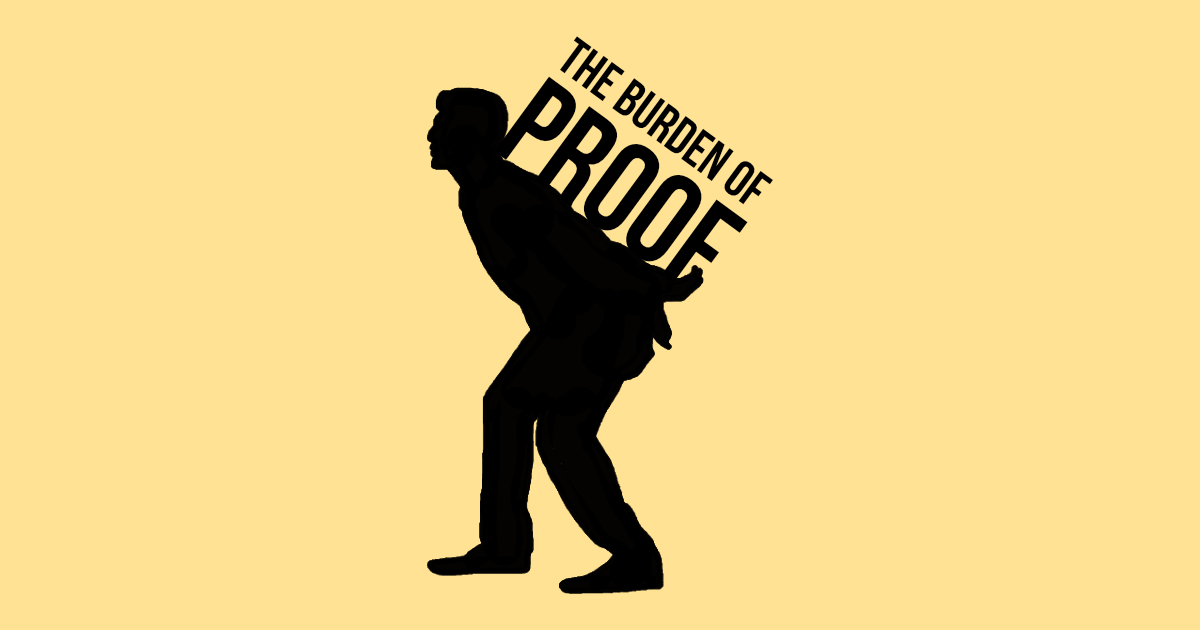 I want to talk for a little bit about the dumbest part of the conversation around Faith and Reason. The “Burden of Proof”. That’s the question, of who it is, in a given debate or conversation, that is required to support their ideas with evidence, and who holds the “default” position. It comes up in every single dang conversation about the Existence of God between theists and atheists, with both sides insisting that they don’t ever have the burden of proof by virtue of who they are.
I want to talk for a little bit about the dumbest part of the conversation around Faith and Reason. The “Burden of Proof”. That’s the question, of who it is, in a given debate or conversation, that is required to support their ideas with evidence, and who holds the “default” position. It comes up in every single dang conversation about the Existence of God between theists and atheists, with both sides insisting that they don’t ever have the burden of proof by virtue of who they are.
This is of course, not the case, but even if it were it would be dumb.
Whoever makes the claim has the burden of proof. So if an atheist walks up to a Christian and says “There is no God” then the atheist would have to prove that claim they made. Meanwhile if a Christian walks up to an atheist and says “There is a god” it would be on them to support that claim.
The sorts of atheists who like to get in arguments on the internet and elsewhere try to avoid this obvious reality by claiming that atheism is not a position at all. They will tell you that atheists do not believe that there is no god, (which would be a statement that could be defended or not) but merely that they “lack belief in a god” which is like, just, whatever bro.
Regardless though, whether or not it is part and parcel of the belief system called “atheism” if a person of any persuasion makes a claim on any sort, “You’re wrong” or “That’s dumb” or “there is no god” then all their posturing about the precise definition of atheist becomes irrelevant. “Okay, so you are an atheist that also believes my Christianity is incorrect. Go ahead and tell me why”
Would-be defenders of Christianity tend to posture in a way that is more complicated, but no less irrelevant. Every society believes in some kind of God as it develops, it is only after quite a bit of time they think of atheist. Perhaps it is a “properly basic belief” a la Immanuel Kant. Perhaps there is an evolutionary argument for it, or against naturalism. Perhaps Calvinism is true and affirmative belief can only come from the Holy Spirit through the Word of God. Whatever! It’s irrelevant! Because no matter how much advanced philosophy and theology you utilize, if you bring up the conversation it’s on you to support it.
But all of that doesn’t even begin to touch on the real idiocy of this metadebate. And that’s what this is, it’s a metadebate. It’s a debate about debate. In every debate there are two sides, there is a PRO and a CON, or an AFF and a NEG. One side talks first, makes a claim, starts a discussion, the other side is defending. The PRO has the burden of proof, the other side has what is called “presumption” meaning that if there were ever a tie, should the other side fail to furnish any argument at all for their perspective, or any evidence, or should both sides manage to thoroughly shoot down the others in exactly equal proportion. The CON would win the debate.
And that’s all you get. You win ties. You do not get to sit back and do nothing. You do not get to be the judge of whether or not the PRO/AFF side has demonstrated their point with absolute certainty or to your personal satisfaction. All you get, by not having the so dutifully avoided “burden of proof” is the presumption in case the other side says absolutely nothing.
That word “proof” throws people off. It doesn’t mean a smoking gun. Circumstantial evidence is enough to overcome presumption in virtually any debate context.
So suppose a Christian makes the claim, takes upon herself the burden of proof. She says “Jesus is LORD”, at which point an atheist, choosing to debate her, can either say “There is no such thing as the Lord” or they can be more careful and say something like “Independent of whatever I believe or don’t believe, I think you are wrong about that” either way, the Christian has the burden of proof.
Then suppose that the atheist does nothing, confident they do not have the burden of proof.
Well then they lose the debate, obviously. As long as the Christian says anything at all, even terrible evidence will win against nothing. “My grandma told me so and she’s real nice” is better than nothing. The only way the say-nothing atheist would win is if the Christian also said nothing. Then the atheist would win on presumption.
Do you see how completely, totally pointless this whole argument is?
Making Judges Delicious
Let’s do another one to break up my shameless self promotion. Actual content that isn;t meta Whohoo.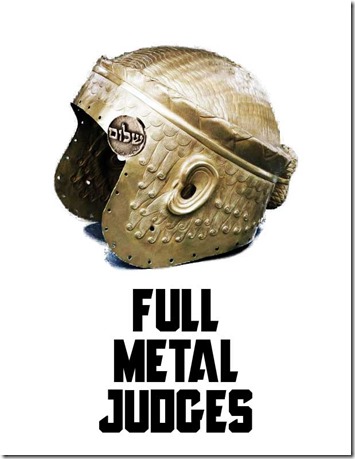
Judges.
Less Whohoo.
Who likes the book of Judges
Nobody likes the book of Judges
I LOVE the book of Judges
It is so much fun, it is so interesting, it is so irreverently insightful, and absolutely never ever boring like “some” books I know of
But I get it, It gets a bad rap and I see why. It does not play nicely with others. It does not conform well to the filter we like to put most of the other books through in which everything becomes a morality story or an example of how to live. It’s violent and sexually explicit and we don’t expect that from the bible.
But we should
After all, we live violent and sexually explicit lives don’t we? Most of us"? Unless we are very very insulated from that stuff. How much of your life would you have to hide from God if God could not bear the sight of blood or urine, or stand hearing about the means of reproduction God himself invented?
The key to making judges delicious, I’ll submit to you, is in allowing it to be what it is and not asking it to be something else. It’s not Mr. Rogers Puppet Time. I like that trolley as much as anyone else, but it’s not the gold standard for everything that’s good. Instead Judges is something very much the opposite. Consider this.
If Joshua is a WWII era film. Judges is a Vietnam movie.
What is Joshua like? The national hero, with the cause that is wholly just and right, marches onto the scene. He is faces with danger, with difficult choices but we, the audience know that whatever he does is going to be right, because he is our man and we trust him implicitly. In the end the heroes reign victorious over the forces of evil. That’s WWII.
Judges comes in after that and says “Sooo, that war we won?” We actually made some compromises we shouldn’t have in order to win it, and now skirmishes are continuing and the next generation is ready to be a lot more honest about the reality of the situation. Particularly: war is ugly, bloody, and often morally grey. A lot of us wonder if we should be involved with it in the first place, but it never seems to go away. Here is the reality. Here are the heroes and the villains, they are mostly the same people. But while you are here let me tell you some incredible stories.
Ehud and the locked door murder mystery.
Deborah and Yael, in the world turned upside down.
Gideon who was like Joshua except in the ways he wasn’t
Jephthah the pirate king
Samson the superhero
Fun adventure stories. Written for adults. With meaning and insight, but not with a neat little moral at the end.
Judges.
Read it.
The Best Movie Ever!
One thing I am really hoping and praying for in the midst of this pandemic is for more Christian content creators to collaborate and intermingle so that their audiences intersect and engage with one another. That is such a beautiful thing the internet does and it would be a shame if we as Christians were so used to NOT doing that that we failed to. My attempt to fix that is called Best Movie Ever where I invite the ministers I know to do what I do, talk about the movies they love with a theological lens.
I hope you enjoy the first of many videos in this format above, and if it makes you hungrier for more Scott Pilgrim (or if you need a refresher) check out THIS free table read from the cast 10 years later
Making Leviticus Delicious
 One of the last articles I wrote before putting the last blog to bed was about broccoli.
One of the last articles I wrote before putting the last blog to bed was about broccoli.
Specifically, it was about how I had learned to roast broccoli in order to bring out it’s flavor and make it enjoyable to eat without covering up it’s broccoliness. And that I thought it would be a worthwhile goal to treat scripture the same way.
I always intended to make something od a series out of that and I never got a round tuit, but since we are doing this again let’s talk about everyone’s least favorite book, the Book of Leviticus.
Seriously.
I actually did a series of 12 count ‘em 12 sermons on Leviticus in two parts at my current church and I am still working there, because Leviticus is fascinating, and more than that it’s fun.
you know what else it is? Bloody, disgusting, complicated, rigid, and old fashioned. The authors knew that about it when they wrote it. The earliest readers knew that about it when they first loved it.
So often we try to protect Leviticus from that, and it’s a mistake! Leviticus is meant to be old. It was old even when it was new (the first community to read it enthusiastically and compile it into Torah was reading it long after the events it describes) but as an old book it illustrated what it looks like when a community seeks to follow God with all their heart. The questions that community asks, and the things they try to do. It demonstrates just how much of our daily life it touches when we start asking those questions (all of it)
And what’s so cool about it. so FUN about it, is that it doesn’t do all that with a series of long theological and ethical treatises. No. It deals with the issue of holiness from the perspective of spectacle.
Do you want to know what God is like? Light a fire big enough to consume an entire calf. Don’t leave the area while it burns. Do you want to feel how faithful God is? Live for a week in a booth or a tent. Do you want to know how evil defiles things? Start thinking very carefully about everything you touch, and everything that touches all of those things.
Leviticus, is a ancient book of really really incredible children’s sermons.
And if you want to watch what that all looks like from the pulpit, I have video
And Another Thing…
And of course when one thinks of revival of a project, it also bears mentioning some things that have changed since “Fear of Whales” about my call to ministry. I’m not only an ordained and established minister, I’m also a father.
We welcomed a beautiful baby girl into the world on Juneteenth, and I got to bring her home on father’s day. Now the world is entirely different.
I don’t tend to talk about my major life changes here with you, I have, this past decade, kept most of these posts strictly ideological. I didn’t talk much about my wedding, for instance, or the romance that took place before it. But then, back then this was a blog about my apprehensions, mistakes, and ideas in preparing for ministry. Now it is becoming something else. So maybe I will begin to. As a pastor, in many ways it is safer, less controversial, less of a confidence issue, to talk about my own life than it is to talk about my ministry experiences. I am as curious as you are to learn what this may become.
On that note, I think I have mentioned before how bad I feel every time I make a blog post about blogging. I talk about the nature of what I am doing and my vision and my goals, and I apologize for not updating more. and then I start updating and then I do it again. I’m not apologizing this time. I’m a dad I have more important things to do than write this blog, if I stop updating, that’ll be why. But i also have the potential to grow and learn, and build an audience as this blog has done before and could again, and this post, this post right here, it’s not even really for you. Dear reader, if there even is even one of you. This one is for me. This one is about getting back in the habit of putting pen to paper week after week after week. And I’m going to have to do that for a while before anyone wants to read any of it.
Tax Day
I am trying to work on taxes today and it is really really hard. I am not sure why it is, but the US Federal government and I have never been able to see eye to eye with regard to my finances. No, it’s not the usual complaints about what percent I am taxed and the Patrick Henry styled stubbornness and greed disguised to my own eyes to look like patriotism. It isn’t that. I get it. We have to pay some money and out of the deal we get roads and bridges and meaningful public programs and works. That’s fine. It’s the process that drives me up the wall. I’ve never been able to get all my forms together in just the way the government wants me to and turn them in on time. And often when i do… It still doesn’t work out.
If the government knows how much they want me to pay why can’t they just bill me?
I type this, trying to create content, trying to keep a blog up that costs less in terms of effort and is updated more than previous attempts, and yet I find myself wanting to delete, wanting to not post. Because why? Because why court controversy about something so stupid by stepping into a political sphere. And yet day by day politics steps further and further into my sphere. We can no longer acknowledge that black people matter without that being some kind of political statement. We can no longer listen to experts about epidemiology. Sometimes politicians literally teargas groups of clergy in order to step onto church grounds without permission and take ridiculous photo ops to make themselves seem righteous. And half the country defends them. Space to be uncontroversially in favor of anything at all is washing away.
At what point do I stand for something because it’s true. At what point do I write about something because I am feeling it?
Especially especially especially because nobody is actually reading.
Are Christians Judgmental Hypocrites?
The previous Post’s Hamilton video was a good example of MOVIEPASStor, one of my channels. Here is the latest example of my other channel.
Hamilton on MOVIEPASStor
So what Kind of “Content” have I been working on lately while I have been gone? Well Just stuff like this
Writing and Rewriting
 As I look back on the hundreds of quick articles I have written. I think about their value. And there is some. Some substantial value even. It’s just going to take a great deal of work to uncover and transform that value. The same is true for my body of sermons, or even the other sermons this church owns from previous pastors in their employ. here’s the thing. Good content, whether visual art, writing, video, whatever, has two steps in it’s creation. Making it, and making it good.
As I look back on the hundreds of quick articles I have written. I think about their value. And there is some. Some substantial value even. It’s just going to take a great deal of work to uncover and transform that value. The same is true for my body of sermons, or even the other sermons this church owns from previous pastors in their employ. here’s the thing. Good content, whether visual art, writing, video, whatever, has two steps in it’s creation. Making it, and making it good.
First you write junk, and then you revise that junk until it’s good. That’s how you get good writing.
There are some good Ideas I’ve stumbled over in the last 10 years. I wonder if anyone will ever revise those ideas into something good.
Who Am I?
 I try to read a lot of books. I don’t always succeed. The War of Art is one I made it through, it was nice and short (although longer than i needed it to be, and dealt chiefly with the problem of resistance and how to overcome it. But there is one other very important idea at the core of this book that I’d like to talk about now. And that’s the idea of identity.
I try to read a lot of books. I don’t always succeed. The War of Art is one I made it through, it was nice and short (although longer than i needed it to be, and dealt chiefly with the problem of resistance and how to overcome it. But there is one other very important idea at the core of this book that I’d like to talk about now. And that’s the idea of identity.
When do you become a writer?
At what point in your career do you become a writer? When you write your first book, when you get it published by a reputable publisher? When someone buys it? When it makes it to the top of a best seller list? or before that? Maybe when you first write something worth publishing. Or when you get an article or an essay posted in a periodical, or when you make money for writing anything, or when you think of the idea and resolutely set about doing the work such that nothing will distract you. Or earlier still.
Stephen Pressfield says you become a writer when you decide to be. You become a writer whenever you want, when you start to answer the question “what do you do” with “I’m a writer” or “I’m an author” instead of “Well I work at Starbucks (or whatever) but one day I hope to write.” Everything else, Stephen argues, is just degrees of the same thing. Identity is in your choice to identify, everything else is hard work.
So I’ve decided to be a online content creator. That includes being a writer, a YouTuber, a web designer and yes (sigh) a self-promoter and marketer. I’m a pastor, but I’m also a writer, and one day I will write a thing people will pay me for. I know I will. Because I already decided to, and all that’s left is hard work.
Becoming an Online Content Creator… Again
Years and years ago I was inspired to start a little blog while i was in college. I wrote and I wrote and I wrote into what became “A Fear of Whales” which chronologed my very long (10 year) process of becoming a full time ordained pastor. I stopped and started, had seasons I was more and less inspired to write. And eventually i stopped completely for years. I had reached the portion of my process that was more confidential, and I didn’t want all of my undeveloped thoughts to be published just then, and then after that, I was ordained, and the blog just stopped making sense. I was no longer that person afraid of whales. I was preaching in Nineveh. (or in this case, Orlando)
It’s time again to start again. The process is over, the first call is stable, and while I might no longer be well described as “fear of whales” I am ready to return to the regular discipline of putting my thoughts on the internet, or at least I think I am. I am doing a lot of other internet content creation this can work with. But I will talk more about that in another update.
Blessings all and I will see you soon, or at least you will see me, in the next article.
In Answer To Your Question…
I know I said I was done with FearOfWhales, but two young confirmants asked me a question while I’m still in Texas, and this is the best way to reliably send answers to them with all the pictures I want to. (If you click on the pictures they should get bigger)
Their question was:
Do you think it is okay to have more than one version of the Bible?
Why or why not?
And My answer is: YES! Absolutley it’s okay. As a matter of fact, I myself havt quite a collection
Like…Probably Too Many
Of course not all of those are different Bibles, but about a third of them are depending on what counts. I want to give you a “Tour” Of some of my favorites
This first one is my “Main” Bible. It’s the one I always carry, the one I brought with me to Florida when I met you
I really like The translation, the NRSV which is a very precice and accurate translation of the Greek and Hebrew. I also like that it fits in my pocket even though it has the whole Bible included New and Old Testaments. A lot of pocket Bibles are just the New with maybe Psalms and Proverbs from the Old. This has it all. Which is good, because the OT is about 2/3 of scripture, and if someone needs me to read something from Genesis, I can be ready if I have this trusty long skinny guy.

 When I was your age I didn’t read the NRSV, because it uses a lot of hard english words, and can be difficult reading. my Olb Bible is an NLT. It’s a bit bigger, and hardback (which is good because that makes it durable)
When I was your age I didn’t read the NRSV, because it uses a lot of hard english words, and can be difficult reading. my Olb Bible is an NLT. It’s a bit bigger, and hardback (which is good because that makes it durable)
If you zoom in on that text you can see that both bibles communicate the same basic ideas, but the one with the duct tape on it says it a lot more simply and conversationally. That makes it easier to read. By the way, speaking of duct tape, some people think it’s sacreligious to have a damaged Bible. I couldn’t disagree more! I want to see Bibles get used. A Bible that has had notes written in it, with torn pages and drinks spilled on it is a bible that’s done it’s job. Someone with a Bible like that loves the Bible. If you never hurt it because you never open it it does you no good at all.

 The Last one I held up in the video is one of my KJV Bibles. This is one of the oldest english translations, and by far the most popular. It’s really beautifully written and phrased, and a lot of people (myself included) memorized verses out of this translation. You will notice the text of the Lord’s prayer is familiar “Who art in heaven, hallowed be thy name…”
The Last one I held up in the video is one of my KJV Bibles. This is one of the oldest english translations, and by far the most popular. It’s really beautifully written and phrased, and a lot of people (myself included) memorized verses out of this translation. You will notice the text of the Lord’s prayer is familiar “Who art in heaven, hallowed be thy name…”
The downside is that people don’t talk the way they did in 1611 anymore, so that makes it hard to understand when you are reading a large portion of the text. And Jesus didn’t speak Shakespearian english either (he didn’t speak english at all) so there is no reason to insist you have to read it this harder way.
You might also notice those citations in the margin there. Those are Chain References. Which help you look up related verses. I’ll talk about those kinds of extra goodies in a bit

 But wait a sec! If Jesus didn’t speak english, and there are all these different translations, Does that mean every Bible is just somebody’s interpretation?!? Of course not. Every English Bible has had to be translated, and translation is not an exact science, but we have people who do it very carefully and have lots of people checking their work. But you don’t have to use an English Bible. Here’s one of my Greek Bibles
But wait a sec! If Jesus didn’t speak english, and there are all these different translations, Does that mean every Bible is just somebody’s interpretation?!? Of course not. Every English Bible has had to be translated, and translation is not an exact science, but we have people who do it very carefully and have lots of people checking their work. But you don’t have to use an English Bible. Here’s one of my Greek Bibles
See those little squiggles? That;s what the apostles actually wrote down about Jesus. And if you wanted to, you could learn Greek and know how to read them.
There is only one version of the Greek New Testament because it’s not a translation. So different copies are just about formatting and footnotes and stuff.
Sometimes for my quiet time in the morning I will open this Greek Bible and begin to make my own personal Pastor Gaffney translation of a few verses. It takes me a long time though because I’m not a Greek expert. I have to have paper and a dictionary out and go word by word.
Same story goes for the Hebrew Old Testament. I have some of those too!

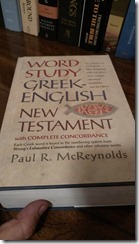 If I want to go easier on myself and have a way to look up Qreek quickly ans easily during a Bible Study or something, when someone might ask me a question I’m not expecting, I pull out my Cheater Bible. The Greek English Parallel New Testament.
If I want to go easier on myself and have a way to look up Qreek quickly ans easily during a Bible Study or something, when someone might ask me a question I’m not expecting, I pull out my Cheater Bible. The Greek English Parallel New Testament.
It’s Awesome! It’s got a standard English Translation on the side, with the Greek words, and the literal english meaning for each word underneath it. Those little numpers on the top are Strongs numbers witch coorespond to an ever bigger doorstop of a book with more information about each word.
This one, ::Ahem:: Does not fit in my pocket.
Of course we can have Bibles in other languages too, besides Greek and English. And this parallel idea comes in really handy for that. Here is  my English/Spanish Parallel Bible. I
my English/Spanish Parallel Bible. I  know just enough spanish to try to read the spanish side, and if I get lost or confused I just look over to the English side. Sometimes the Spanish language does a better job of communicating a particular idea. Sometimes English is better.
know just enough spanish to try to read the spanish side, and if I get lost or confused I just look over to the English side. Sometimes the Spanish language does a better job of communicating a particular idea. Sometimes English is better.
 When I worked at a Korean Church, I used my Korean/English Parallel Bible. I don’t speak Korean (I can sound it out sorta) but It was handy to be able to open to a page to
When I worked at a Korean Church, I used my Korean/English Parallel Bible. I don’t speak Korean (I can sound it out sorta) but It was handy to be able to open to a page to  read a verse, and show someone who speaks Korean better than English that same verse in the language they are more confortable with.
read a verse, and show someone who speaks Korean better than English that same verse in the language they are more confortable with.
People should always chose a version of the Bible that they are confortable with. That way they will actually read it!
You will notice that the english text of both of these is exactly the same. They both use the NIV, which is the most popular English translation, and a darn good one too!
I have just a couple more that I think are cool.

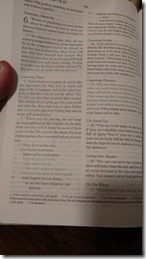 This one is called “The Green Bible”. Do you notice how some Bibles have the words of Christ in bed? Well this one has words that deal with Creation and the Enviornment in green.
This one is called “The Green Bible”. Do you notice how some Bibles have the words of Christ in bed? Well this one has words that deal with Creation and the Enviornment in green.
I Know! It’s a really touchy subject and it annoys a lot of people that this was done. Maybe it annoys you a little.
I think it’s an interesting example of how a Bible’s presentation can affect how it is read. This has exactly the same words and verses as my Red letter NRSV. It’s just…Green.
Also, the hemp cover is really cool and cheaper than leather.
Next we have the big heavy Bible they recommened for my Seminary. 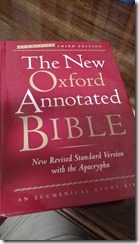 You can see I didn’t use
You can see I didn’t use  it much, but it’s a good reference. Besides the scriptures it’s got a bunch of footnotes that reference theologians talking about that verse.
it much, but it’s a good reference. Besides the scriptures it’s got a bunch of footnotes that reference theologians talking about that verse.
 It also has the Apocrapha. Which is a set of books that were written in between the time of the Old and New Testaments. We don’t think they are a part of God’s Word, but some Christians do, and they are good Historical documents to have handy if you are a big Bible geek like me.
It also has the Apocrapha. Which is a set of books that were written in between the time of the Old and New Testaments. We don’t think they are a part of God’s Word, but some Christians do, and they are good Historical documents to have handy if you are a big Bible geek like me.

 Speaking of footnotes, this Life Application Bible is nice. It’s not as schooley as the Seminary Bible and has footnotes that deal less with what Theologians think, and more with questions that a regular everyday Christian might wonder about. It also has some great charts and maps. You can see the Bonus content is more than half the page!
Speaking of footnotes, this Life Application Bible is nice. It’s not as schooley as the Seminary Bible and has footnotes that deal less with what Theologians think, and more with questions that a regular everyday Christian might wonder about. It also has some great charts and maps. You can see the Bonus content is more than half the page!
 You have to be careful with these though, because in the same book, printed in the same kind of ink, you have the words of Holy Scripture that are inspired by God, right next to something that’s just somebody’s oponion and comments. You don’t want to get confused about which is which. The comments that come with these tend to be very useful, but also very biased theologically. So I use a couple different ones when I am writing a sermon of something, and I pay attention to the author of the particular suplements I’m reading. The Lutheran one at right for instance, is of course going to have footnotes written from a Lutheran perspective, even though the Verses are exactly the same as in my Pocket NRSV
You have to be careful with these though, because in the same book, printed in the same kind of ink, you have the words of Holy Scripture that are inspired by God, right next to something that’s just somebody’s oponion and comments. You don’t want to get confused about which is which. The comments that come with these tend to be very useful, but also very biased theologically. So I use a couple different ones when I am writing a sermon of something, and I pay attention to the author of the particular suplements I’m reading. The Lutheran one at right for instance, is of course going to have footnotes written from a Lutheran perspective, even though the Verses are exactly the same as in my Pocket NRSV
You can go overboard though. How many comments is too many? If you get enough you might end up with something like this:
Believe it or not, that’s a Bible… In 13 Volumes. It’s got every single verse of scripture there in the right order, but it also has pages and pages of notes and comments and historical background info. 90% of every page is notes. Which is great, but obviously not what anyone would pick as the Bible they bring to Church for instance.
I could literally do this all day, showing off advantages and disadvantages of my favorite Bibles. 
 Like the SuperCheater Amplified Bible at Left, or the Begining of the Old Testament translated by Jewish people at Right, but then where would it ever end?
Like the SuperCheater Amplified Bible at Left, or the Begining of the Old Testament translated by Jewish people at Right, but then where would it ever end?
Eventually I just have to say “Yes” I think it’s totally awesome to have more than one version of the Bible. I also think it’s okay to stick to just one, like my wife. Who likes to write in her Bible and wants to be able to find it again.
If you want to look thorugh any of these in person just let me know when I get there in a little under 2 months.
It’s All Over
College Park Presbyterian Church had their congrogational vote this past sunday. I am going to be their new Pastor. The long road is finally at an end.
There will of course be a few more hoops to jump. Examination by presbytery. Instalation and Ordination. But i will not be able to openly reflect on these as they happen. Perhaps an addendum is in order but that will be much later, maybe a year from now.
In the meantime I appreciate those of you who have read some of my journey, and helped facilitate and motivate me to write my half baked ideas for years and years. I thought a bout starting a new blog, a middle blog about starting in ordained ministry, or transforming this one. But i doubt I will have time. I’m going to have to use what I have practiced here for curricula, and newsletters, and other orderly church communication.
Thank you again.
Only about Ten Heresies
A long long time ago I was in college and had a very clever college pastor. Things didn’t work out, it’s a long story told during my first year of blogging, but he had one very good idea that I keep coming back to.
”There are only really about ten heresies” He said. They just keep coming back once everyone forgets we already condemned them. I think he has an incredible point that clariefies much of christian history.
I don’t claim to have the athouratative list bit i’ve been working on it. Basicly you go one way or the other with one of a couple important parts of the faith, like:
TRINITY: Denying the Oneness
If you think that one of the parts of the trinity is more important than the other parts, or that they all work together for form God like voltron instead of being God in and of themselfs, you done goofed. We have silly names for it like Tritheism and Pneumatomachianism, but basicly they are all various ways to fail to aknowledge God is one
TRINITY: Denying the Threeness
If you feel like being wrong about the trinity, but counting to one is not a problem for you, you may liket to deny God’s Threeness. Call it Modalism, or Patripassionism or Oneness Pentecostalism, it’s all one thing and it was condemned in Smyrna long long ago.
JESUS: Denying the Goditude
Maybe Jesus was a mortal man who was adopted by God, or maybe he was the union of word and flesh, but distinct from and lower than the “Son of God”. Maybe he’s really just a symbol and not a real thing we should actually look for in history. Whatever dude. I don’t need to memorize a new name for this mistake. It’s wrong.
JESUS: Denying the Manitude
So If that’s wrong that maybe we should go the other way. Maybe gos only “appeared” to be Jesus and his earthly form was an illusion, or maybe he was so perfect that he kinda metaphorically hovered a quarter inch off the ground. Maybe his divine nature totally usurped and superceded his human nature and made it irrelevant. Nope. None of those are true. Christ was fully human.
SALVATION: Denying the Law
This one is popular (and popularly condemned) right now. Sort of a Universalist “noncondemnationalism” I can do whatever i want, believe whatever I want, God forgives anything and everything for everyone all the time. There is no condemnation for those that are in Christ Jesus… But the bible, and all of church history has some pretty concrete things to say about those that are not in Christ Jesus, whether they go to church or not.
SALVATION: Denying the Gospel
This one is even more common, and frighteningly rarley condemned in the subculture. Orthodox Christians profess salvation by Grace alone through faith alone but nothing. So if you have a belief that “you are not saved unless you ____ “ it does not matter what you fill the blank with, you are a heretic. Because you are not saved unless Jesus saves you, and what you do has nothing to do with it. It used to be called “Pelegianism” not it’s more commonly called “Legalism” but while the former was clearly denounced as a rejection of Jesus and everything he lived died for, the latter is usually meant to mean someone should lighten up. Legalists should not “lighten up” they should repent and believe the good news. They are wrong.
…
I honestly can’t think of any more off the top of my head.
What do you think?
Does that cover it?
Should I make room for something about Eschatology? Being obsessed with the bay or hour, vs denying the parousia?
I thought about some behavorial heresies like antinomianism, but honesly I think those are covered under salvation.
You tell me
Broccoli
 I like broccoli a lot, but didn’t always like broccoli.
I like broccoli a lot, but didn’t always like broccoli.
It used to be something that I tolerated, because I knew it was good for me.
I didn’t hate it or anything. I just considered it palatable only when covered in gobs of ranch, or cheese.
Then one say everyting changed.
I found a recipie, that sugested roasting brocoli with olive oil and garlic on high heat for a short time.
It was an absolute game changer in my relationship with brocoli.
Suddenly i could eat broccoli as a main course, center stage in a dish, and really enjoy it for what it is! This recipie even helped me appreciate other dishes with broccoli in them, because I feel like I know what the broccoli flavor is really all about now.
Why an I telling you this?
I feel like a lot of people have a relationship with scripture that is like my relationship to broccoli. We know it is good for us, but we don’t enjoy it. We stuff it down when we can, by serving it alongside worship songs and didactic sermons. We read “devotionals” instead of scritures, and we tell ourselfs they count because they mention scripture verses in them, but we don’t stop and ask ourselfs why the scriptures cannot be the main course.
We don’t like the taste.
That’s the reason. And it’s a legitimate one. We find it boring, or confusing, or irrelevant, or bitter. So we make sure to cover the taste with something sweet or cheesy, and then show off our clean plate.
But I think there is a way to serve scripture as a main course that people authentically love, and don’t have to pretend be fine with. I thinks that’s how scripture got to be scripture in the first place. I think that if we dispense with the search for dressings, and set about figuring our how to roast it right, we will change people’s relationship to the Word of God.
I just haven’t figured out what it is yet.
This analogy, more than anything else, closley describes what I hope to do with my life of ministry.
Find that broccoli recipie for every book in scripture, and teach it to people.
2016 Has Actually Been Great For Me.
A few days ago we all said goodbye to Carrie Fischer, perhaps the actress I most beloved in childhood. Prior to that were the deaths of Alan Rickman, Gene Wilder, David Bowie, and the Great Barrier Reef. This combined with a grim election season, a increase in poliece shootings, and several crises on top of one another like the Flint water crisis, the Dakota Pipeline, and last but not least, the Syrian Cival War, have lead many to decry the year 2016 as the worst in history, and announce that they cannot wait for it’s end.
Which is why I feel a little guilty admitting it has been the best year of my life.
 The year started for me, when I asked Tiffany’s parents for her hand. In Janurary, I took a whirlwind tour of Turkey following Paul’s Missionary Journy on scholarship. My last semester was incredibly challenging, and I rocked it! Preaching regularly, planning a wedding, and ultimatley graduating above my goal of a 3.5 GPA with a Master of Divinity Degree.
The year started for me, when I asked Tiffany’s parents for her hand. In Janurary, I took a whirlwind tour of Turkey following Paul’s Missionary Journy on scholarship. My last semester was incredibly challenging, and I rocked it! Preaching regularly, planning a wedding, and ultimatley graduating above my goal of a 3.5 GPA with a Master of Divinity Degree.
Then came the wedding, the honeymoon, and the begining of our lives together in a new apartment, with a new car, and a new dog “Obi Wan”.
As the news around us internationally we were working to build community and fight isolation in our home of San Marcos. And saw the development of a new gaming group, a weekly coffeehouse meetup, a pubnight, two biblestudies, ane three potluck events with our new neighbors.
Things look broght for 2017 as well, with new employment and ordination prospects, It looks like Tiffany and I will be able to write out own ticket.
All this, as usual, has beconed me to reflect. And to wonder why it is that I celebrate while so many suffer. Am I insulated from their suffering? And if so, is that a result of privlege or hard work? Is it all going to start paying off because I have built my house on the proverbial Rock, or did I just luck out?
So often in the past as I worried about the future I rolled my eyes at the suggestion that closeness to Christ and faithfullness to his call would result in some kind of emotional security and temporal blessing. Repeatedly throughout my life I have reflected that things were just below “fine” and religiosity was absoltutely not helping. Is this just another up that will lead to another down?
Only one way to find out!
Merry Christmas, The Characters of RENT are Horrible People!
It’s Christmas, so I am rewatching a number of Old holiday favorites: Die Hard, First Blood, Elf, you now, the classics. 
I happened upon RENT this year, which I watched and enjoyed in theatres when it first came out. It’s a holiday musical about young people, alternative lifestyles, and telling Christians they are doing it wrong. So it’s pretty much the total package as far as I’m interested. Only trouble is, I’m not as young as I used to be, the story made more sense this time, and these bold cultural rebels have started to seem a lot more like horrible people that deserve everything that’s coming to them.
Imma show you what I mean.
First of all: The problem is not that a lot of the characters are queer. I’m fine with that, I certainly don’t think that liking members of the same sex means you deserve to die in poverty. Things like refusing to work, committing crimes, and being irresponsible in handling infectious diseases however to have a tendancy to make one poor and dead.
Homosexuality has become a smokescreen for these characters. Anyone who criticises them just doesn;t understands, and is really homophobic. They do something horrible and then kiss, “Hey mister, she’s my sister” they respond to the shocked faces. “Ooooo” the audience responds. Look at those bad judgemental peole who cannot appreciate love. Unfortunatley, I’ve seen this attitude played out in real life too.
The plot of the play begns with Mark and Roger, neither of which is gainfully employed but who nevertheless live on the lower east side. Mark is a filmmaker who has never made a film. Roger is a guitarist who hasn’t played in a year. This arrangment is possible only because their former roommate Benny is the landlord and has allowed them to become a full year late on rent. They steal power and burn things indoors without a chimney, but they are mad that they might have to pay anything at all. He tells them that if they don’t pay he  will have to kick them out. They sing about how hard their life is for a while before resolving into a musical crecendo that they are not going to pay rent… ever.
will have to kick them out. They sing about how hard their life is for a while before resolving into a musical crecendo that they are not going to pay rent… ever.
How is this okay? Who is okay with this? How are we as an audience supposed to expect and cheer for any resolution to this besides eviction?
Enter Angel who kills Benny’s dog for money, and uses that money to buy booze for everyone. He’s therefore a hero and we all like him, but it’s not kindness, he makes it clear in a long sont that he expects the favor to be returned “Today for you, Tomarrow for me”
Oh and there is also a bi-girl who cheats on everyone while pretending to be monogamous. She is an “actress” who puts on disjointed and masterbatory shows that nobody would ever pay for tickets for. She is also mad at Benny because she wants the performance space rent-free just like the boys apartment and he won’t give it to her.
It’s not that these characters have no moral code. It’s just that their moral code is terrible and wrong. These characters identify the following things as immoral in the movie
- Expecting payment for services (with Benny obviously, but also the server at the cafe)
- Accepting a paying job with artistic flexibility (this was called “selling out” and Mark felt guilty for it)
- Ever not having sex with someone (Roger told Mimi “another day” and it was a big deal)
It’s worth noting concerning #3 that both Mimi and Roger had aids, neither knew about the other one, and neither told the other one they had it as a reason why whe might not want to have promiscous sex right now. This is not considered a valid excuse, and the Roger is very sorry he refused to infect what he thought was an innocent girl with a fatal disease, or contract a fatal disease from her. His bad.
And the strangest thing about all this, the strangest thing is that Benny is right there as a member of the main cast, making all the sense in the world about how fucked up this all is, and serving as a foil to the horrible characters.
They make fun — yet I’m the one
Attempting to do some good
This dude has a POINT!
I don’t know how I ever watched this with a straight face.
Oh. And one last thing. There are 525960 minutes in a year. Can’t these people do anything right?
Failure Experienced
Last week I opined on the importance of failure in generating success. I alluded to the fact that it isn’t taught or discussed enough. This week I want to talk about how I learned the truth of it, if noone taught me.
I learned it the hard way.
I’ve never failed harder then when I left Kansas. Of course I cringe, even today, to use that word. There are ways in which I wonder if it’s accurate. Good ministry took place in the years I spent there. Yet my Job was to plant a new ministry, and I left with that work unfinished. And that was because of certain things I did wrong.
The truth I can say now that I coulden’t say then is that I was pushed out. The Regional Director (My Boss’s Boss) who hired me was promoted away soon after I started (he’s actually been promoted again and is now President of InterVarsity) The person that replaced him and I never really saw eye-to-eye.
I neglected fundraising for as long as I could, and depended instead on the endowlment that had been built up by previous donors. As much as I intended to, I wasn’t good at communication with supporters.
Finally, I made cultural mistakes. Having never been an IV student, I didn’t know all of the uwritten rules. I believed it when I was told that the annual retreats were opportunities to rest. In actuality those were the most important times to demonstrate compotence. My bosses rarely saw my work on campus, they only saw how excited about IV I was at staff retreats.
All of these things formed a perfect storm, and I wasn’t fired, but more and more of my supplemantary funding started being taken from me, while at the same time I started to be scrutinised more closley, while at the same time I saw staff begin to distance themselfs from me socially. I saw the writing on the wall.
I remember walking alone on dark train tracks after submitting my resignation. Manhattan Kansas was a new place. It was no longer my ministry context, it was just my home. I lamented aloud, and wondered how God had allowed this to happen. After all my students were reporting good things, I was growing as a person and as a minister, my work on campus was solid. How could I fail? What happened to my subbosedly God-given vision to start something new?
How could I fail if I had been doing something God wanted done?
I still don’t have a great answer for all that. I can say that the pat Christian answer is wrong. It’s not so simplisticly true that if we are faithful we will succeed at everything we attempt. Instead I am living proof that you can do your best, try your hardest, and devote years of your life to something righteous, and that’s still no guarentee. Sometimes Shit just happens. Sometimes obstacles you didn’t expect and coulden’t have expected get in your way.
And in that place, God is with you. In that place there is grace and love. And the fact that sometimes we fall down can actually serve to encourage us that falling doesn’t make us bad or wrong, and can give us the confidence to get up and try again.
How To Fail
"Ever tried. Ever failed. No matter. Try Again. Fail again. Fail better." – Samuel Beckett
I don’t talk enough about my failures.
It’s a complicated situation to talk about. Many Christians don’t understand failure, and think failure and faithfulness do not go together. All of us, even me, have a tendancy to wonder what a failing person did wrong. So it becomes dangerous for leaders to talk about their failures. So leaders don’t. So the misunderstanding never gets fixed.
The truth is that most ministry fails. What’s more, the ministry that succeeds does so for a number of factors that are complicated, and usually unknown to us. The reality then, is that the best way to create a successful ministry, is to create unsuccessful ministries until one fails to be unsuccessful. That’s my method.
I can’t count the number of small groups I’ve worked with, projects I’ve started, dreams I’ve invested time and money in, that have ended in failure. Some died in the womb, some did not survive implementation, some lasted a long time before eventually turning belly up. All of them offered lessons and insight of course, but I’m not going to sit here and pretend that the lessons learned are always useful. Save one.
They all taught me how to fail.
Every other field knows this. If you ask a writer how to write well, they will tell you to write every day, get all the bad writing out of your system, one day you will realise it’s gotten good. Ask a game designer how to make good games, you make a prototype, playtest and fail. You ask a salesman how to sell, It’s a numbers game, get 100 “NOs”… Why then, when you ask someone how to minister do they tell you to continue in steadfast prayer and fasting?
Let’s fail boldly into the future.
Self-Sabotage
One of the really frustrating realities of writing a blog about one’s life is that anyone could read it. It’s not anonymous, and therefore the juciest, most compelling bits, must always be left on the cutting room floor.
Anytime I write about a frustration I am currently experiencing, I risk making that frustration a lot worse. Because the people that are frustrating me could read it. This of course is compounded by my theory that Blogs are supposed to be half-baked because I’m not even prepared to stand behind what I write! I’m just processing here!
When I left InterVarsity I had plenty of material to write on and think about regarding failure. I felt like I had let my students down and was being edged out of ministry, and I wanted to talk about what that felt like in the moment. I was also looking for a new Job, and It didn’t make any sense to have a series of articles about all the mistakes I had made. So I let those ideas simmer and wrote on more disposable media.
Again in seminary I had thoughts and feelings about community life and about progressive theology and the ways people on the left fail to practice many of the good things they preach. Again I felt it was better if I continued to be able to live at peace in my dorm, as opposed to having more scathing content for the blog.
Even now, as I deal with the ordination process, and work on planting, I have content begging to be published about how to help planters and not hurt them, or about effective and ineffective ministry expectations… and yet, I want to be ordained.
It’s not that I never wrote on any of these things. Just that it all had to be neutered, to some degree.
This is all to be expected, this happens in all forms of writing to some degree. And this is a blog after all. It’s not a priority in my life and it shoulden’t be. And yet years later those articles about failure and community life still beg to be written, and I mourn for the fact that whatever form they take, they will never be as raw and authentic as if they were written back when writing might have cost me something.
I’m going to try anyway. Next week!
Back in Action
It’s that time again.
Time for another Dang meta-post where i blog about blogging and talk about what I expect this to be.
I don’t know why I keep doing these. I can’t imagine people really wanting to read them, and yet I can’t seem to get myself to return to talking about interesting ideas and processing thoughts until I adress in some way the fact that It’s been another couple months since I’ve posted anything at all.
 I have a good excuse. I got married. And I moved, and I graduated with a Masters Degree, and I Bought a car, planted a church, left two jobs, and traveled to California, Florida, and California again. I’ve been BUSY.
I have a good excuse. I got married. And I moved, and I graduated with a Masters Degree, and I Bought a car, planted a church, left two jobs, and traveled to California, Florida, and California again. I’ve been BUSY.
In the midst of al of that the finish line has been running away from me.
I wrote in my last meta-post that this blog may be coming to an end. It’s really about my preparation for ministry, and I was thinking I’d ordained and installed by not. Nope. There are more hoops, more complications, more obsticles.
I’m trying to be medatative about that reality, and think deeply about the fact that ten years ago I considered myself a minister, and everything I have done since then has only made me feel like more of a chatecumin. Maybe the journey never ends. Maybe i will never feel to myself like a “real” pastor.
But I have people in my life now who are calling me Pastor. I’ve been preaching regularly for years now. When that finish line does come I don’t know what it’ll look like anymore.
Reading the Bible for Fun and Prophet
How should one read the Bible? Should one study a little piece at a time? Should the whole thing be read cover to cover? If so, Where does one begin? Actually it’s a trick question. The Bible is not one thing, and for optimal enjoyment, you should not read it all the same way.
You need to consider the particular books of the Bible as individual documents with particular identities and not approach them each the same way. Some books There are best read and enjoyed in one sitting and become confusing when parsed apart into verses (Esther, Job, Revelation) are other books in the canon (like Proverbs) that become dreary and incomprehensible when read all in a lump. Most of the books are somewhere in between. Like Psalms, where one psalm has little to do with the next, but certainly needs to be read in it’s entirety as a psalm. The canon order puts all the historical together, and all the prophets together, and that makes reading them a slog. That means it’s generally not advisable to go in order for the same reason you wouldn’t eat all the beef in your monthly diet on the same day, and then all the vegetables on the next. You wanna mix it up.
Then there are the genre’s of the text. Is this text primarily for instruction, is it for inspiration, for encouragement, for reproof? Is it just an interesting character study or a funny story? Is it a dispassionate statement of historical fact or a stirring morality tale wrapped in allegory? The answer to those questions depends entirely to which part of the Bible you are talking about.
So where to start? That depends. And it matters. Where you start will lay your foundation and set your bias for your reading of the rest of scripture. If you start in Romans, you will be inclined to read the rest of the Bible through the lens of salvation by grace alone like me and the protestant reformers, and you won’t be able to get it completely out of your head when you open Isaiah. If you start with The Torah like many in the Messianic community suggest, you will understand Jesus as a Rabbi much better than you will understand Jesus as Lord the first time you study the Gospels. Wherever you start, it will become important to come back again and reread the text with new eyes, being open to the new things the spirit says to who you are as a reader that time.
If you are new to ancient Jewish texts, I recommend Mark. But I do so pretty arbitrarily (it’s nice and short, narrative). You can read it for as long or as short as you want, but remember that this is supposed to be fun and interesting. Stop when it’s not, and move on. Easy peasy
“Don’t Think, Just Believe” -WHAT???
Sometimes I encounter people who claim to approach the bible in a childlike manner, and invariably, that so should I! Just have blind faith and do what it instructs. Do not question God. But I just have a really hard time with that.
 I mean, I disagree, but that’s besides the point. I don’t think it’s biblical, but most things aren’t. I have a hard time with it because I cannot even understand what those words are meant to imply, or how a person can think they think those words are true. Let me explain”
I mean, I disagree, but that’s besides the point. I don’t think it’s biblical, but most things aren’t. I have a hard time with it because I cannot even understand what those words are meant to imply, or how a person can think they think those words are true. Let me explain”
I understand theoretically how someone can approach the Bible in a trusting and blind sort of way. "I’m just going to blindly follow this" they would say as they begin to read the book.
But after you DO IT for a while it has to become less blind. What happens when the Bible makes allusions to Greek Mythology and expects you to be familiar with them? What about all the references to other books we don’t have like Paul’s "earlier letter" in First(!?) Corinthians or the "Annals of the Kings Of Judah" in First Kings? Did you read those? The Bible told you to.
And what about all the stuff that is not instruction? Or did you somehow manage to get through Psalms and Revelation without being the least bit curious why we needed that many words for God to say "Be good". If indeed, those books do a poor job of that, then what are they for? That requires thought.
Also, Leviticus is a thing. Do these people "blindly follow" Leviticus? If do do they also at the same time blindly follow the totally different organizational structure that it laid out in the Pastoral Epistles? How?
The Bible makes you think. It FORCES it. Trying to "Just believe" the Bible is like trying to "Just Believe" Shakespeare, or Mozart. It’s not just wrong, it’s incomprehensible.
Talk To People
Almost three years ago I wrote an article here condemning the trend to “Raise Awareness” as an alternative to actually making a difference. I challenged my readers to think of things to do to make the world a better place other than fundraising, marketing, and shopping.
It’s a tough challenge to rise to. It seems there are two levels of involvement. Either I become Rambo and save the child soldiers myself with my homemade bow and arrow, or I just “like” Rambo on Facebook. We are not presented with a lot of “middle” level challenge options to participate in the healing of the world. But here’s one:
Talk to people.
Break down the walls of separation that insulate you and your life from the lives of people who are different.
 Go to the place where we hide the old people (Retirement Home) and talk to them. Listen to their stories from recent history, learn from them about their lives and how they wish they had lived differently. Comfort them in their loneliness and fear of death. Sometimes just listen to them ramble even if you can’t understand. Be there.
Go to the place where we hide the old people (Retirement Home) and talk to them. Listen to their stories from recent history, learn from them about their lives and how they wish they had lived differently. Comfort them in their loneliness and fear of death. Sometimes just listen to them ramble even if you can’t understand. Be there.
Go to the place where we hide the sick and dying (Hospital). Talk to the people there. Volunteer to walk with the chaplain and help the chaplain with anything they need done. Many chaplains make “rounds” to all the patients, but really wish they had time to spend with the one or two in crisis who really need attention. Volunteer to cover the rounds. While you are there think about your own mortality. Affirm what the patients say about their feelings.
Go to the place where we hide the poor (Shelter) Talk to people. Bring some food or something if that helps your guilt, but don’t let it excuse it. Feel your guilt. Know that everything you have was given my God and the roles could easily have been reversed. Learn from them about their exciting stories of survival in the jungle that you call a comfortable home. Treat them as people for what will probably be the first time. Ask them where their friends who are not in the shelter sleep and then go there, because only a select group go to the shelter.
Go to the place where they hide people of color (Ghetto) Talk to the people there. Realize they are mostly Christians. Seek their instruction in the ways of Jesus. Their context as a culture is different from yours and sees different things. Their context as a people who are not in power resembles the people of the bible more closely than your own people.
When you talk to all those people (and any others you can think of). As they express felt needs, apart from the need to be heard which I promise you they feel. Then and only then should you begin to up the challenge level as you craft service projects to begin to meet those expressed needs.
Suddenly, She Bears!
One of the worst stories of the bible is found in II Kings 2:23-24 I want to do some work on interpreting it in a positive way. it goes like this
From there Elisha went up to Bethel. As he was walking along the road, some boys came out of the town and jeered at him. “Get out of here, baldy!” they said. “Get out of here, baldy!” He turned around, looked at them and called down a curse on them in the name of the Lord. Then two bears came out of the woods and mauled forty-two of the boys.
Many of the passages of the bible that seem violent or unjust put us in defensive-mode exegetically. We start looking for outs. “Maybe it’s a metaphor!” we say. Or perhaps the opposite “Maybe the point is simply to know it happened”. The same questions are asked with Joshua’s conquest, or with Jacob’s two wives. Etc.
 I suspect many ancient readers would take this story at face value, believing this to have actually happened historically, and believing it to be justified on both God’s and Elisha’s part because the kids were evil and deserved it. The sort of skepticism about whether or not stories really happened exactly as described is a later development.
I suspect many ancient readers would take this story at face value, believing this to have actually happened historically, and believing it to be justified on both God’s and Elisha’s part because the kids were evil and deserved it. The sort of skepticism about whether or not stories really happened exactly as described is a later development.
Therefore, while assuming it happened, believing it happened would not have been of special importance to them. The book of Kings repeatedly tells you that if you are looking for complete historical records you should look elsewhere! So the question becomes "What would it mean to ancient readers that this story took place?"
It would mean God is mighty, that Elisha is empowered through Gods and all of God’s prophets by extension are so empowered. It would mean that God and God’s prophets do not abide being mocked.
Throughout Kings, there is a tension between Kings and Prophets. Who has the real power? This passage says Prophets do. Kings may control armies and political structures, but those things are useless against a person who does not need agriculture to eat, because they are fed by ravens, who can fight using obedient wild beasts, for whom the earth itself is subservient.
Kings therefore, had better listen to prophets, or they will see their empires split and their armies fall.
But now that the historic prophets and kings have fallen away, What does that mean to us? How does it impact out lives of faith?
I think the passage still speaks to alternative forms of power. In the age of Eric Snowden and Chelsea Manning, bloggers and street artists can bring politicians to their knees. Police might brutalize young people of color, but young people of color equipped with video cameras and a firm moral backbone can fight back and win. The prophets of our age will not be mocked. They possess the sway of the crowds and the voice of the truth and against them no political or institutional power can stand!
The false ones will fall of course. God is not with them. But if you find yourself on the wrong side of a true prophet. If you find yourself mocking a person speaking truth to power saying "bald and powerless young idiot, give up" well then you had better watch out. You better look behind you. They have more power than you know.
…or something like that.
In Defense of Street Evangelism
 Five years ago I got off a plane for an orientation with a Christian College Ministry I took a job with, and learned the training was going to entail going out and talking to strangers about the gospel. It was a very uncomfortable realization.
Five years ago I got off a plane for an orientation with a Christian College Ministry I took a job with, and learned the training was going to entail going out and talking to strangers about the gospel. It was a very uncomfortable realization.
Street preaching, and street evangelism have become such a presence in our minds that the mere thought of it seems to cause anger to bubble up from deep within us. We have all seen bad preachers yelling at people, or disaffected church members made to stand on corners with impersonal tracts. For many Christians, that is the image conjured by the word “evangelism” and they conclude therefore that they do not like evangelism!
And that’s the funny thing. Most of us hate it. But many of us feel conflicted, because at some level we thing we are supposed to like it. Like it’s this good thing “evangelism” that we know we are all called to do. But we hate it and we want it to go away.
And we are right to hate the things we have seen. Being mean, hateful, judgmental, or yelling at people in public is bad behavior. This should be obvious and non-controversial. Street preaching does not get a free pass. You are not morally allowed to engage in bad behavior because you call it “street preaching”
Street preaching however also does not deserve unilateral condemnation. Just because some people have behaved badly and called it street preaching, does not mean that anything which could be considered preaching on a street is bad behavior.
I have come to think that loving, interesting, engaging, street preaching can be a great way for people who have never had the experience of talking about their faith to others to practice. The street is a low consequence environment with lots of people, so approaching one of them, swallowing your own sense of awkwardness and saying something like “Would you have time to talk about God with me?” even to hear a lot of “no” can make it much easier when that situation comes up with your friends and associates.
I don’t think a lot of people have authentic conversions as a result of street preaching, even good street preaching. I do not think the numbers reported by the ministries are accurate. (What kind of follow-up is really being done?) But I do think there is a place for it. Evangelism after all, is not all about conversions.
Small Groups and Gender Segregation
I wrote last week about a difficulty I have finding bible studies that study the Bible in a sea of group meetings that study other things they feel are more interesting or more important. I want to follow up on that with a related idea.
 What is up with all the separated men’s groups and women’s groups?
What is up with all the separated men’s groups and women’s groups?
What exactly are we afraid of happening with unmarried people in a room together?
It made a certain amount of sense to separate the girls and boys when I was 9 and girls were yucky, or when I was 14 and girls my age were adults already. But I am seeing nary a coed study group at many churches straight through to death.
If there is a mixed group it’s for married couples. Still, men go to the Men’s Breakfast, women go to their Beth Moore class. Why?!?
Well I’ll tell you why actually. It’s because of this same stupid trend of fearing and avoiding the Bible and talking about something else instead. Men’s groups end up talking about Lust and Porn the whole time. Women’s groups probably end up talking about Submission and “Biblical Womanhood” and such crap. Married groups talk about how to have a good Christian marriage. And that is the practical extent of our Christian education.
There is no way that in an authentic inductive study of the book of Judges you need to get vulnerable about your masturbation habits. That simply will never ever come up. And if an emergent issue does arrive, you know how to pull someone aside.
There are 66 books in scripture. 1 Corinthians 6 is one chapter. If you need to split for that week. Or the 1 Timothy 2 week or the Ephesians 5. Fine. I’d submit that there is much to be gained even in those chapters from having both voices, but I’ll grant that sometimes people need to feel extra safe. Still, I see no reason for that to be the topic every week. EVER. It shouldn’t even be one week every year.
Let’s quit pretending like the central issues of Christian discipleship are gender specific.




